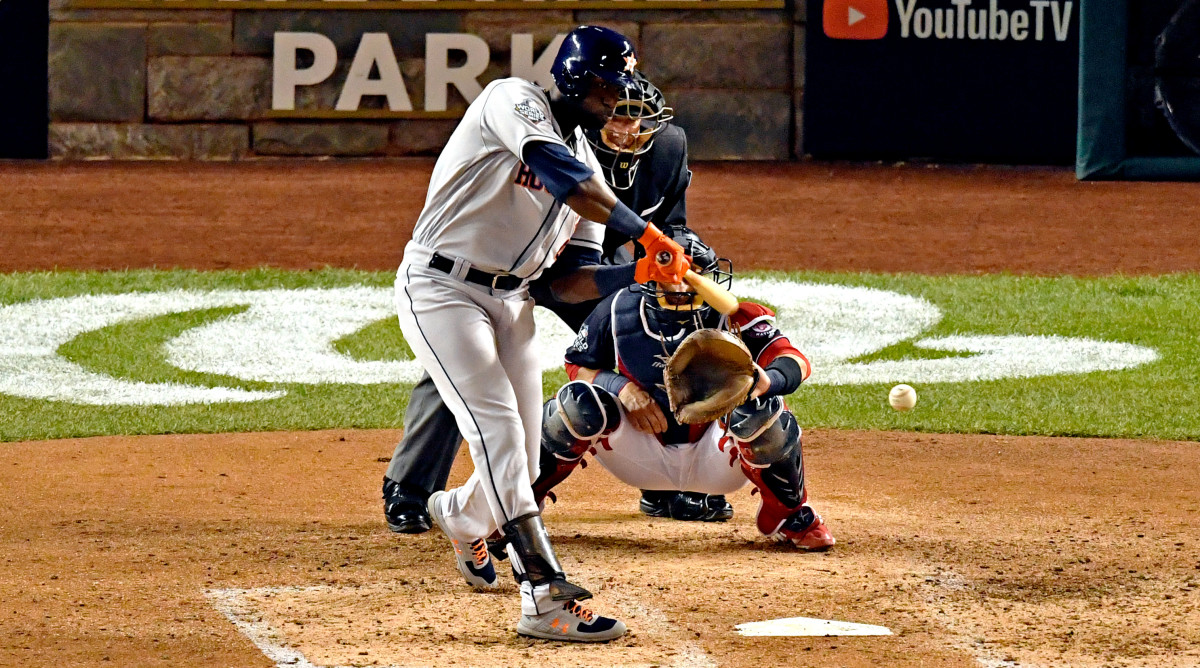Álvarez Breaks Out of Slump With Correa's Help in Astros' Game 5 Win


WASHINGTON — At his worst, when he was breaking a bat in frustration and being pinch-hit for with the bases loaded and generally looking like the 22-year-old rookie he is, Yordan Álvarez needed some guidance, whether he wanted it or not. That overmatched, flailing hothead bore almost no resemblance to the sturdily built phenom who, 21 months removed A-ball, made his major league debut in June, whacked 27 home runs in 87 games and started at designated hitter for the best offense in baseball.
The calm, confident Álvarez arrived at Nationals Park on Sunday afternoon before Game 5 of the World Series. That was the Álvarez who hit a two-run home run that gave the Astros a lead they would not relinquish on their way to a 7–1 win. That was the Álvarez who helped them board their flight to Houston one win away from their second championship in three years.
But that Álvarez had gone missing during the ALCS, when the Yankees held him to one hit, a single, in 22 at bats. In Game 2 of that series, with the score tied in the eighth inning, Álvarez chased a slider in the dirt for strike three. He slammed his bat into the ground, then snapped the lumber over his knee. In Game 6, as Houston tried to extend a 4–2 lead in the eighth, Álvarez’s spot in the batting order came due with the bases loaded and two out. Manager A.J. Hinch sent up 195-pound infielder Aledmys Díaz instead.
Shortstop Carlos Correa is only 25 years old, but he knows something about precociousness. The Astros took him first in the 2012 draft from Puerto Rico Baseball Academy, and he doggedly studied English because he felt a star should be bilingual. He won Rookie of the Year at 20 and keyed Houston to its first World Series title at 22. He has recently adopted a new role: leader.
“Bro,” Correa said to Álvarez in Spanish, ”Breaking bats and stuff—that’s not going to get you out of a slump. You have to put in your work. You have to watch your videos. You have to want it.”
They discussed zone control and elbow placement and bat path. Correa needed the reminders, too: He entered Game 5 hitting .161 in October. He missed two months this summer with a broken rib and another this fall with back tightness so painful that he spent team flights lying in the aisle. After he went 0–3 in Game 1 of the ALCS, he spent an hour in the video room, dissecting his swing. He hit in the batting cage the next day and felt certain he had found something. He began crowing to teammates about the game-winning home run he would hit. In the 11th inning, with the score tied at 2, he hammered a fastball into the rightfield stands.
On Sunday, he felt that same certainty—about Álvarez. The young slugger had not started either of the first two games in D.C., where the teams did not use a DH. Hinch preferred a strong outfield defense behind flyball pitchers Zack Greinke, in Game 3, and José Urquidy, in Game 4, so he used the lead-footed Álvarez only as a bat off the bench. Álvarez popped out both times. He had not gone deep since Sept. 21.
Still, Álvarez had begun feeling more focused at the plate. And when Correa saw that, with strikeout pitcher Gerrit Cole on the mound, Álvarez was starting Game 5 in leftfield, he began pumping him up. “It’s your night, brother!” he insisted. “You’re going to hit a home run today!”
“He’s too good a hitter not to hit a home run in the playoffs,” Correa explained later. Reminded that the Astros had at least one more game to play and the home run could have come then, he shrugged. “Today was the day,” he said.
In the second inning, with one on and one out and no score, Álvarez strode to the plate looking for a pitch down the middle, something he could drive. He got it on the first pitch. He took it for a strike. He did not react except to adjust his batting gloves. The next pitch was a fastball just inside. He did not chase. Another fastball, farther inside. And then a sinker over the outside corner. Álvarez ripped it into the leftfield stands, where it connected with the stomach of a man who elected not to protect himself by dropping either of the Bud Lights he held. As Álvarez rounded third, Correa screamed at him, “I told you! I told you! I told you, bro, you are the man!”
The man who took this homer off the chest so he didn’t spill or drop his beers is our supreme leader now pic.twitter.com/FYDhpT273G
— SI Media (@SISportsMedia) October 28, 2019
That was the performance of the night, Correa said after the game. Cole pitched well, centerfielder George Springer hit a double and a home run, but Álvarez’s shot meant most.
There was another person with a moment worth mentioning, though: Correa himself. In the fourth inning, with one on and two out, he laid off a two-strike slider just outside. “A perfect pitch,” he said. Four pitches later, he got another slider, this one at his belt. He smacked it over the leftfield wall.
Álvarez congratulated Correa on his way back to the dugout. This time it was the younger man offering words of wisdom. “When you wish good for others,” Álvarez said, “Good things come back to you.”
